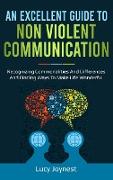- Start
- AN EXCELLENT GUIDE TO NON VIOLENT COMMUNICATION
AN EXCELLENT GUIDE TO NON VIOLENT COMMUNICATION
Angebote / Angebote:
Nonviolent Communication offers techniques that help people to perform each of the four steps of the communication process well, both when listening to others and when speaking in front of others.Thus, in any dialogue, a person practicing the technique strives to regain the natural state of compassion that allows him or her to observe objectively what the other person is saying, even when the words arouse prejudice or are hostile. He or she can then identify the feelings being expressed and the needs behind those feelings, so that he or she can understand the real demands of the other person. When expressing himself/herself, the person tries to take an objective look at the situation (observation), to honestly identify what he/she feels (feelings) and what motivates his/her intervention (needs), and tries to formulate clearly what he/she wants (demand). Specifically:Observe the situation: This step involves learning to distinguish between evaluation and observation. It involves replacing generalizations and abusive judgments (often sources of conflict) with a detailed and precise description of the facts. If the interlocutor feels judged, he or she will then tend to put himself or herself in a position of self-defense rather than listening and understanding. Moreover, evaluations make the world static and prone to standardization while reality is constantly changing."Language is an imperfect instrument for talking about stability and normality, while reality is changing and made up of differences.Acknowledging the feeling: Here it is a matter of becoming aware of the feeling caused by the previous situation, and naming it using the whole range of affective vocabulary. It is a question of knowing how to express what one feels with honesty and common sense, without fear of being vulnerable and avoiding expressing an opinion or interpreting (verb "to feel" when expressing a thought rather than a feeling). We need to know ourselves in order to distinguish between what we feel and what we think we are. Lack of emotional vocabulary is often synonymous with poor communication.
Fremdlagertitel. Lieferzeit unbestimmt

